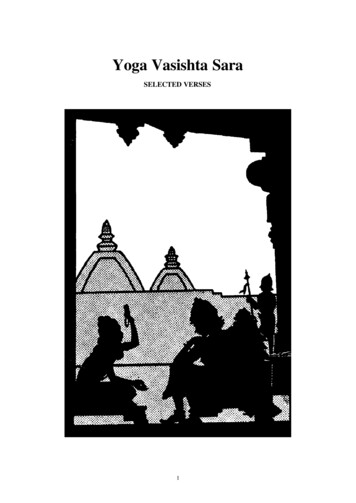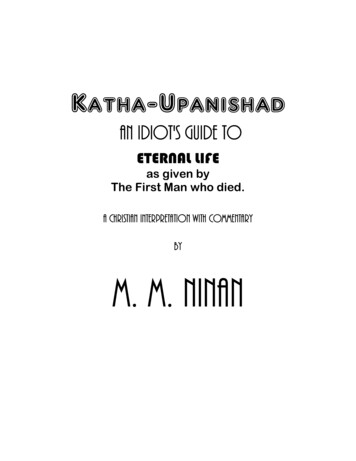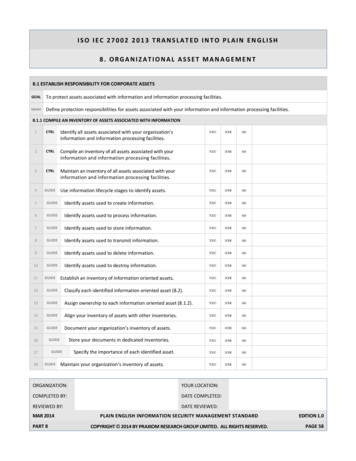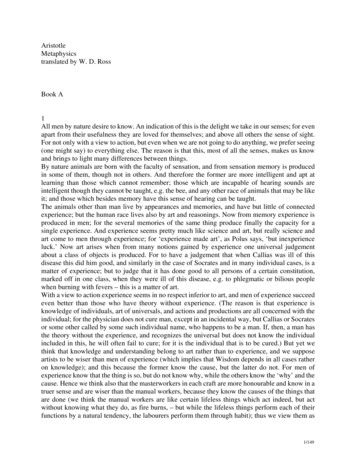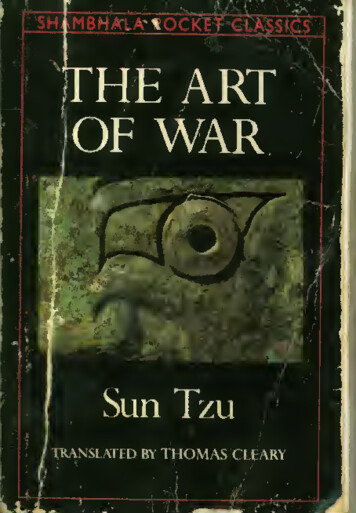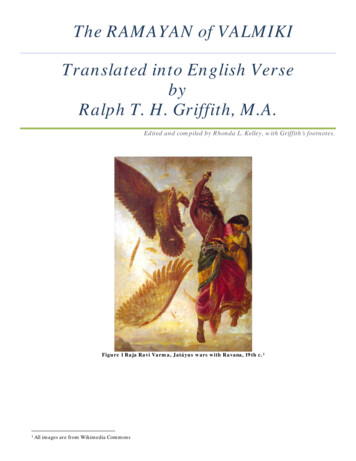
Transcription
The RAMAYAN of VALMIKITranslated into English VersebyRalph T. H. Griffith, M.A.Edited and compiled by Rhonda L. Kelley, with Griffith’s footnotes.Figure 1 Raja Ravi Varma, Jatáyus wars with Ravana, 19th c. 11All images are from Wikimedia Commons
The Ramayana (“Journey of Rama”), one of the classics of ancient Indian literature, is a Sanskrit epicpoem consisting of 7 Books dating as far back as to the 5th c. BCE with additions as late as the 2nd c. BCE. Itsauthorship is attributed to the Hindu sage Valmiki who appears in the epic as the hermit who gives Sita shelterafter Rama banishes her. The Ramayana is the allegorical tale of the birth, childhood, and adult adventures ofthe eponymous Rama, who is an avatar of the Hindu god Vishnu and, along with his wife Sita, the embodimentof human virtue. The Ramayan of Valmiki is the 1870 verse translation by the 19th c. British scholar RalphGriffith.RLKBook I: Bala Kanda (“The Book of the Childhood”): Summary 2The origins and childhood of Rama. Sita’s birth, betrothal, and marriage to Rama.Dasharatha, king of Ayodhya, had three wives Kausalya, Kaikeyi, and Sumitra. Having been childlessfor a long time and anxious to produce an heir, he performs a fire sacrifice. As a consequence, Rama is born toKausalya, Bharata is born to Kaikeyi, and the twins Lakshmana and Satrughna are born to Sumitra. These sonsare endowed, to various degrees, with the essence of the Supreme God Vishnu; Vishnu had opted to be borninto mortality to combat the demon Ravana, who was oppressing the gods, and who could only be destroyed bya mortal. During their upbringing the princes receive instructions from the Vedas (scriptures) and in warfare.When Rama is 16 years old, the sage Vishwamitra comes to the court of Dasharatha in search of help againstdemons who were disturbing sacrificial rites. He chooses Rama, who is followed by Lakshmana, his constantcompanion throughout the story. Rama and Lakshmana receive instructions and supernatural weapons fromthe sage and destroy the demons.Janaka was the king of Mithila. One day, the king found a female child in the field in a deep furrow dug byhis plough. King Janaka adopted the girl and named her Sita, the Sanskrit word for “furrow”. Sita grew up to bea girl of unparalleled beauty and charm. When Sita was of marriageable age, the king decided to have aswayamvara3 which included a contest. The king was in possession of an immensely heavy bow, presented tohim by the Destroyer God Shiva: whoever could wield the bow could marry Sita. The sage Vishwamitra attendsthe swayamvara with Rama and Lakshmana. Only Rama is able to wield the bow and, when he draws thestring, it breaks. Marriages are arranged between the sons of Dasharatha and daughters of Janaka. Ramamarries Sita, and his brothers marry other brides from among the people of Mithila.Figure 2 Artist unknown, The birth of the four divine sons of King Dasharatha, 1712.All summaries (with some editing for grammar, spelling, and clarity) are from the Wikipedia page on The Ramayana.The swayamvara is the process in which a young woman chooses a husband from a list of eligible suitors. Typically theswayamvara includes the analysis of the groom’s natal chart. (RLK)23
Book II: Ayodhya Kanda (“The Book of Ayodhya”): SelectionsThe preparations for Rama’s coronation in the city of Ayodhya, his exile into the forest, and theregency of Bharata.After Rama and Sita have been married for twelve years, an elderly Dasharatha expresses his desire tocrown Rama king, to which the assembly and his subjects express their support. On the eve of the coronation,Dasharatha’s wife Kaikeyi—her jealousy aroused by Manthara, a wicked maidservant—claims two boons thatDasharatha had long ago granted her. Kaikeyi demands Rama to be exiled into the wilderness for fourteenyears and that the succession pass to her son Bharata. The heartbroken king, constrained by his rigid devotionto his oath, accedes to Kaikeyi’s demands. Rama accepts his father’s reluctant decree with absolute submissionand calm self-control, two of the virtues that characterize him throughout the story. Sita and his half-brotherLakshmana join him in his exile. After Rama’s departure, King Dasharatha, unable to bear the grief, passesaway.Meanwhile, Bharata, who was visiting his maternal uncle, learns about the events in Ajodhya. Bharatarefuses to profit from his mother’s wicked scheming and visits Rama in the forest. Rama, determined to carryout his father’s orders to the letter, refuses to return before the fourteen years are over. Bharata refuses to beking, instead styling himself “Regent” and keeping Rama’s sandals on the throne as symbolic of Rama’s statusas the rightful king of Ayodhya.Figure 3 Rama, Sita, and Lakshmana at the Hermitage of Bharadvaja: Page from a dispersed Ramayana (Story ofKing Rama), ca. 1780 44 “Rama, Sita, and Lakshmana at the Hermitage of Bharadvaja: Page from a dispersed Ramayana (Story of King Rama) [India(Punjab Hills, Kangra)]” (1976.15) In Heilbrunn Timeline of Art History . New York: The Metropolitan Museum of Art, /1976.15. (October 2006)
In the selections for this chapter, Cantos XVII-XIX pick up the story as Rama approaches the thronefor his coronation. In Cantos XXVI-XXXI, Rama has already accepted his exile and informs Sita he isleaving. Sita and Lakshmana request and are granted permission to go with him.Canto XVII. Rama’s Approach.As Rama, rendering blithe and gayHis loving friends, pursued his way,He saw on either hand a pressOf mingled people numberless.The royal street he traversed, whereIncense of aloe filled the air,Where rose high palaces, that viedWith paly clouds, on either side;With flowers of myriad colours graced.And food for every varied taste,Bright as the glowing path o’erheadWhich feet of Gods celestial tread,Loud benedictions, sweet to hear,From countless voices soothed his ear.While he to each gave due saluteHis place and dignity to suit:“Be thou,” the joyful people cried,“Be thou our guardian, lord and guide.Throned and anointed king to-day,Thy feet set forth upon the wayWherein, each honoured as a God,Thy fathers and forefathers trod.Thy sire and his have graced the throne,And loving care to us have shown:Thus blest shall we and ours remain,Yea still more blest in Rama’s reign.No more of dainty fare we need,And but one cherished object heed,That we may see our prince todayInvested with imperial sway.”Such were the words and pleasant speechThat Rama heard, unmoved, from eachOf the dear friends around him spread,As onward through the street he sped,For none could turn his eye or thoughtFrom the dear form his glances sought,With fruitless ardour forward castEven when Raghu’s son 5 had past.And he who saw not Rama nigh,Nor caught a look from Rama’s eye,A mark for scorn and general blame,Reproached himself in bitter shame.For to each class his equal mind5 Raghu was one of the most celebrated ancestors of Rama whose commonest appellation is, therefore, Raghava or descendant ofRaghu.
With sympathy and love inclinedMost fully of the princely four,So greatest love to him they bore.His circling course the hero bentRound shrine and altar, reverent,Round homes of Gods, where cross-roads met,Where many a sacred tree was set.Near to his father’s house he drewLike Indra’s 6 beautiful to view,And with the light his glory gaveWithin the royal palace drave.Through three broad courts, where bowmen keptTheir watch and ward, his coursers swept,Then through the two remaining wentOn foot the prince preeminent.Through all the courts the hero passed,And gained the ladies’ bower at last;Then through the door alone withdrew,And left without his retinue.When thus the monarch’s noble boyHad gone his sire to meet,The multitude, elate with joy,Stood watching in the street,And his return with eager eyesExpected at the gates,As for his darling moon to riseThe King of Rivers 7 waits.Canto XVIII. The Sentence.With hopeless eye and pallid mienThere sat the monarch with the queen.His father’s feet with reverence dueHe clasped, and touched Kaikeyi’s 8 too.The king, with eyes still brimming o’er,Cried “Rama!” and could do no more.His voice was choked, his eye was dim,He could not speak or look on him.Then sudden fear made Rama shakeAs though his foot had roused a snake,Soon as his eyes had seen the changeSo mournful, terrible, and strange.For there his reason well-nigh fled,Sighing, with soul disquieted,To torturing pangs a prey,Dismayed, despairing, and distraught,In a fierce whirl of wildering thoughtThe hapless monarch lay,Chief of the Hindu gods; God of Thunder.sea.8 The youngest of the three queens; mother of Bharat; at this point she has already demanded Rama’s banishment, but he isunaware (RLK).67The
Like Ocean wave-engarlandedStorm-driven from his tranquil bed,The Sun-God in eclipse,Or like a holy seer, heart-stirredWith anguish, when a lying wordHas passed his heedless lips.The sight of his dear father, painedWith woe and misery unexplainedFilled Rama with unrest,As Ocean’s pulses rise and swellWhen the great moon he loves so wellShines full upon his breast.So grieving for his father’s sake,To his own heart the hero spake:“Why will the king my sire to-dayNo kindly word of greeting say?At other times, though wroth he be,His eyes grow calm that look on me.Then why does anguish wring his browTo see his well-beloved now?”Sick and perplexed, distraught with woe,To Queen Kaikeyi bowing low,While pallor o’er his bright cheek spread,With humble reverence he said:“What have I done, unknown, amissTo make my father wroth like this?Declare it, O dear Queen, and winHis pardon for my heedless sin.Why is the sire I ever findFilled with all love to-day unkind?With eyes cast down and pallid cheekThis day alone he will not speak.Or lies he prostrate neath the blowOf fierce disease or sudden woe?For all our bliss is dashed with pain,And joy unmixt is hard to gain.Does stroke of evil fortune smiteDear Bharat, charming to the sight,Or on the brave Satrughna 9 fall,Or consorts, for he loves them all?Against his words when I rebel,Or fail to please the monarch well,When deeds of mine his soul offend,That hour I pray my life may end.How should a man to him who gaveHis being and his life behave?The sire to whom he owes his birthShould be his deity on earth.Hast thou, by pride and folly moved,With bitter taunt the king reproved?9Bharat and Shatrughna are Rama’s half-brothers who are out of town (RLK).
Has scorn of thine or cruel jestTo passion stirred his gentle breast?Speak truly, Queen, that I may knowWhat cause has changed the monarch so.”Thus by the high-souled prince addressed,Of Raghu’s sons the chief and best,She cast all ruth 10 and shame aside,And bold with greedy words replied:“Not wrath, O Rama, stirs the king,Nor misery stabs with sudden sting;One thought that fills his soul has he,But dares not speak for fear of thee.Thou art so dear, his lips refrainFrom words that might his darling pain.But thou, as duty bids, must stillThe promise of thy sire fulfil.He who to me in days gone byVouchsafed a boon with honours high,Dares now, a king, his word regret,And caitiff-like 11 disowns the debt.The lord of men his promise gaveTo grant the boon that I might crave,And now a bridge would idly throwWhen the dried stream has ceased to flow.His faith the monarch must not breakIn wrath, or e’en for thy dear sake.From faith, as well the righteous know,Our virtue and our merits flow.Now, be they good or be they ill,Do thou thy father’s words fulfil:Swear that his promise shall not fail,And I will tell thee all the tale.Yes, Rama, when I hear that thouHast bound thee by thy father’s vow,Then, not till then, my lips shall speak,Nor will he tell what boon I seek.”He heard, and with a troubled breastThis answer to the queen addressed:“Ah me, dear lady, canst thou deemThat words like these thy lips beseem?I, at the bidding of my sire,Would cast my body to the fire,A deadly draught of poison drink,Or in the waves of ocean sink:If he command, it shall be done,—My father and my king in one.Then speak and let me know the thing1011pity (RLK)cowardly (RLK)
So longed for by my lord the king.It shall be done: let this suffice;Rama ne’er makes a promise twice.”He ended. To the princely youthWho loved the right and spoke the truth,Cruel, abominable cameThe answer of the ruthless dame:“When Gods and Titans fought of yore,Transfixed with darts and bathed in goreTwo boons to me thy father gaveFor the dear life ‘twas mine to save.Of him I claim the ancient debt,That Bharat on the throne be set,And thou, O Rama, go this dayTo Dandak forest far away.Now, Rama, if thou wilt maintainThy father’s faith without a stain,And thine own truth and honour clear,Then, best of men, my bidding hear.Do thou thy father’s word obey,Nor from the pledge he gave me stray.Thy life in Dandak forest spendTill nine long years and five shall end.Upon my Bharat’s princely headLet consecrating drops be shed,With all the royal pomp for theeMade ready by the king’s decree.Seek Dandak forest and resignRites that would make the empire thine,For twice seven years of exile wearThe coat of bark and matted hair.Then in thy stead let Bharat reignLord of his royal sire’s domain,Rich in the fairest gems that shine,Cars, elephants, and steeds, and kine 12.The monarch mourns thy altered fateAnd vails his brow compassionate:Bowed down by bitter grief he liesAnd dares not lift to thine his eyes.Obey his word: be firm and brave,And with great truth the monarch save.”While thus with cruel words she spoke,No grief the noble youth betrayed;But forth the father’s anguish broke,At his dear Rama’s lot dismayed.Canto XIX. Rama’s Promise.Calm and unmoved by threatened woe12Cows (RLK).
The noble conqueror of the foeAnswered the cruel words she spoke,Nor quailed beneath the murderous stroke:“Yea, for my father’s promise sakeI to the wood my way will take,And dwell a lonely exile thereIn hermit dress with matted hair.One thing alone I fain would learn,Why is the king this day so stern?Why is the scourge of foes so cold,Nor gives me greeting as of old?Now let not anger flush thy cheek:Before thy face the truth I speak,In hermit’s coat with matted hairTo the wild wood will I repair.How can I fail his will to do,Friend, master, grateful sovereign too?One only pang consumes my breast:That his own lips have not expressedHis will, nor made his longing knownThat Bharat should ascend the throne.To Bharat I would yield my wife,My realm and wealth, mine own dear life,Unasked I fain would yield them all:More gladly at my father’s call,More gladly when the gift may freeHis honour and bring joy to thee.Thus, lady, his sad heart releaseFrom the sore shame, and give him peace.But tell me, O, I pray thee, whyThe lord of men, with downcast eye,Lies prostrate thus, and one by oneDown his pale cheek the tear-drops run.Let couriers to thy father speedOn horses of the swiftest breed,And, by the mandate of the king,Thy Bharat to his presence bring.My father’s words I will not stayTo question, but this very dayTo Dandak’s pathless wild will fare,For twice seven years an exile there.”When Rama thus had made replyKaikeyi’s heart with joy beat high.She, trusting to the pledge she held,The youth’s departure thus impelled:“‘Tis well. Be messengers despatchedOn coursers ne’er for fleetness matched,To seek my father’s home and leadMy Bharat back with all their speed.And, Rama, as I ween that thouWilt scarce endure to linger now,
So surely it were wise and goodThis hour to journey to the wood.And if, with shame cast down and weak,No word to thee the king can speak,Forgive, and from thy mind dismissA trifle in an hour like this.But till thy feet in rapid hasteHave left the city for the waste,And to the distant forest fled,He will not bathe nor call for bread.”“Woe! woe!” from the sad monarch burst,In surging floods of grief immersed;Then swooning, with his wits astray,Upon the gold-wrought couch he lay,And Rama raised the aged king:But the stern queen, unpitying,Checked not her needless words, nor sparedThe hero for all speed prepared,But urged him with her bitter tongue,Like a good horse with lashes stung,She spoke her shameful speech. SereneHe heard the fury of the queen,And to her words so vile and dreadGently, unmoved in mind, he said:“I would not in this world remainA grovelling thrall to paltry gain,But duty’s path would fain pursue,True as the saints themselves are true.From death itself I would not flyMy father’s wish to gratify,What deed soe’er his loving sonMay do to please him, think it done.Amid all duties, Queen, I countThis duty first and paramount,That sons, obedient, aye fulfilTheir honoured fathers’ word and will.Without his word, if thou decree,Forth to the forest will I flee,And there shall fourteen years be spentMid lonely wilds in banishment.Methinks thou couldst not hope to findOne spark of virtue in my mind,If thou, whose wish is still my lord,Hast for this grace the king implored.This day I go, but, ere we part,Must cheer my Sita’s tender heart,To my dear mother bid farewell;Then to the woods, a while to dwell.With thee, O Queen, the care must restThat Bharat hear his sire’s behest,And guard the land with righteous sway,
For such the law that lives for aye.”In speechless woe the father heard,Wept with loud cries, but spoke no word.Then Rama touched his senseless feet,And hers, for honour most unmeet;Round both his circling steps he bent,Then from the bower the hero went.Soon as he reached the gate he foundHis dear companions gathered round.Behind him came Sumitra’s child 13With weeping eyes so sad and wild.Then saw he all that rich arrayOf vases for the glorious day.Round them with reverent stops he paced,Nor vailed his eye, nor moved in haste.The loss of empire could not dimThe glory that encompassed him.So will the Lord of Cooling Rays 14On whom the world delights to gaze,Through the great love of all retainSweet splendour in the time of wane.Now to the exile’s lot resignedHe left the rule of earth behind:As though all worldly cares he spurnedNo trouble was in him discerned.The chouries 15 that for kings are used,And white umbrella, he refused,Dismissed his chariot and his men,And every friend and citizen.He ruled his senses, nor betrayedThe grief that on his bosom weighed,And thus his mother’s mansion soughtTo tell the mournful news he brought.Nor could the gay-clad people thereWho flocked round Rama true and fair,One sign of altered fortune traceUpon the splendid hero’s face.Nor had the chieftain, mighty-armed,Lost the bright look all hearts that charmed,As e’en from autumn moons is thrownA splendour which is all their own.With his sweet voice the hero spokeSaluting all the gathered folk,Then righteous-souled and great in fameClose to his mother’s house he came.Lakshman the brave, his brother’s peerIn princely virtues, followed near,Sore troubled, but resolved to showLakshmana (RLK)The moon.15 Fans (RLK)1314
No token of his secret woe.Thus to the palace Rama wentWhere all were gay with hope and joy;But well he knew the dire eventThat hope would mar, that bliss destroy.So to his grief he would not yieldLest the sad change their hearts might rend,And, the dread tiding unrevealed,Spared from the blow each faithful friend.[Cantos XX-XXV: Rama bids farewell to his father and mother]Canto XXVI. Alone With Sita.So Rama, to his purpose true,To Queen Kausalya 16 bade adieu,Received the benison she gave,And to the path of duty clave.As through the crowded street he passed,A radiance on the way he cast,And each fair grace, by all approved,The bosoms of the people moved.Now of the woeful change no wordThe fair Videhan 17 bride had heard;The thought of that imperial riteStill filled her bosom with delight.With grateful heart and joyful thoughtThe Gods in worship she had sought,And, well in royal duties learned,Sat longing till her lord returned,Not all unmarked by grief and shameWithin his sumptuous home he came,And hurried through the happy crowdWith eye dejected, gloomy-browed.Up Sita sprang, and every limbTrembled with fear at sight of him.She marked that cheek where anguish fed,Those senses care-disquieted.For, when he looked on her, no moreCould his heart hide the load it bore,Nor could the pious chief controlThe paleness o’er his cheek that stole.His altered cheer, his brow bedewedWith clammy drops, his grief she viewed,And cried, consumed with fires of woe,“What, O my lord, has changed thee so?Vrihaspati 18 looks down benign,And the moon rests in Pushya’s sign, 19Rama’s mother (RLK).Sita. Videha was the country of which Mithila was the capital.18 The Lord of Speech and preceptor of the Gods.1617
As Brahmans 20 sage this day declare:Then whence, my lord, this grief and care?Why does no canopy, like foamFor its white beauty, shade thee home,Its hundred ribs spread wide to throwSplendour on thy fair head below?Where are the royal fans, to graceThe lotus beauty of thy face,Fair as the moon or wild-swan’s wing,And waving round the new-made king?Why do no sweet-toned bards rejoiceTo hail thee with triumphant voice?No tuneful heralds love to raiseLoud music in their monarch’s praise?Why do no Brahmans, Scripture-read,Pour curds and honey on thy head,Anointed, as the laws ordain,With holy rites, supreme to reign?Where are the chiefs of every guild?Where are the myriads should have filledThe streets, and followed home their kingWith merry noise and triumphing?Why does no gold-wrought chariot leadWith four brave horses, best for speed?No elephant precede the crowdLike a huge hill or thunder cloud,Marked from his birth for happy fate,Whom signs auspicious decorate?Why does no henchman, young and fair,Precede thee, and delight to bearEntrusted to his reverent holdThe burthen of thy throne of gold?Why, if the consecrating riteBe ready, why this mournful plight?Why do I see this sudden change,This altered mien so sad and strange?”To her, as thus she weeping cried,Raghu’s illustrious son replied:“Sita, my honoured sire’s decreeCommands me to the woods to flee.O high-born lady, nobly bredIn the good paths thy footsteps tread,Hear, Janak’s 21 daughter, while I tellThe story as it all befell.Of old my father true and braveTwo boons to Queen Kaikeyi gave.Through these the preparations madeFor me to-day by her are stayed,Pisces (RLK).The highest caste, the priesthood (RLK).21 Janak (Janaka) is Sita’s father; he is King of Mithila.1920
For he is bound to disallowThis promise by that earlier vow.In Dandak forest wild and vastMust fourteen years by me be passed.My father’s will makes Bharat heir,The kingdom and the throne to share.Now, ere the lonely wild I seek,I come once more with thee to speak.In Bharat’s presence, O my dame,Ne’er speak with pride of Rama’s name:Another’s eulogy to hearIs hateful to a monarch’s ear.Thou must with love his rule obeyTo whom my father yields the sway.With love and sweet observance learnHis grace, and more the king’s, to earn.Now, that my father may not breakThe words of promise that he spake,To the drear wood my steps are bent:Be firm, good Sita, and content.Through all that time, my blameless spouse,Keep well thy fasts and holy vows.Rise from thy bed at break of day,And to the Gods due worship pay.With meek and lowly love revereThe lord of men, my father dear,And reverence to Kausalya show,My mother, worn with eld 22 and woe:By duty’s law, O best of dames,High worship from thy love she claims,Nor to the other queens refuseObservance, rendering each her dues:By love and fond attention shownThey are my mothers like mine own.Let Bharat and Satrughna bearIn thy sweet love a special share:Dear as my life, O let them beLike brother and like son to thee.In every word and deed refrainFrom aught that Bharat’s soul may pain:He is Ayodhya’s king and mine,The head and lord of all our line.For those who serve and love them muchWith weariless endeavour, touchAnd win the gracious hearts of kings.While wrath from disobedience springs.Great monarchs from their presence sendTheir lawful sons who still offend,And welcome to the vacant placeGood children of an alien race.22old age (RLK)
Then, best of women, rest thou here,And Bharat’s will with love revere.Obedient to thy king remain,And still thy vows of truth maintain.To the wide wood my steps I bend:Make thou thy dwelling here;See that thy conduct ne’er offend,And keep my words, my dear.”Canto XXVII. Sita’s Speech.His sweetly-speaking bride, who bestDeserved her lord, he thus addressed.Then tender love bade passion wake,And thus the fair Videhan spake:“What words are these that thou hast said?Contempt of me the thought has bred.O best of heroes, I dismissWith bitter scorn a speech like this:Unworthy of a warrior’s fameIt taints a monarch’s son with shame,Ne’er to be heard from those who knowThe science of the sword and bow.My lord, the mother, sire, and sonReceive their lots by merit won;The brother and the daughter findThe portions to their deeds assigned.The wife alone, whate’er await,Must share on earth her husband’s fate.So now the king’s command which sendsThee to the wild, to me extends.The wife can find no refuge, none,In father, mother, self, or son:Both here, and when they vanish hence,Her husband is her sole defence.If, Raghu’s son, thy steps are ledWhere Dandak’s pathless wilds are spread,My foot before thine own shall passThrough tangled thorn and matted grass.Dismiss thine anger and thy doubt:Like refuse water cast them out,And lead me, O my hero, hence—I know not sin—with confidence.Whate’er his lot, ‘tis far more sweetTo follow still a husband’s feetThan in rich palaces to lie,Or roam at pleasure through the sky.My mother and my sire have taughtWhat duty bids, and trained each thought,Nor have I now mine ear to turnThe duties of a wife to learn.I’ll seek with thee the woodland dell
And pathless wild where no men dwell,Where tribes of silvan 23 creatures roam,And many a tiger makes his home.My life shall pass as pleasant thereAs in my father’s palace fair.The worlds shall wake no care in me;My only care be truth to thee.There while thy wish I still obey,True to my vows with thee I’ll stray,And there shall blissful hours be spentIn woods with honey redolent.In forest shades thy mighty armWould keep a stranger’s life from harm,And how shall Sita think of fearWhen thou, O glorious lord, art near?Heir of high bliss, my choice is made,Nor can I from my will be stayed.Doubt not; the earth will yield me roots,These will I eat, and woodland fruits;And as with thee I wander thereI will not bring thee grief or care.I long, when thou, wise lord, art nigh,All fearless, with delighted eyeTo gaze upon the rocky hill,The lake, the fountain, and the rill;To sport with thee, my limbs to cool,In some pure lily-covered pool,While the white swan’s and mallard’s wingsAre plashing in the water-springs.So would a thousand seasons fleeLike one sweet day, if spent with thee.Without my lord I would not prizeA home with Gods above the skies:Without my lord, my life to bless,Where could be heaven or happiness?Forbid me not: with thee I goThe tangled wood to tread.There will I live with thee, as thoughThis roof were o’er my head.My will for thine shall be resigned;Thy feet my steps shall guide.Thou, only thou, art in my mind:I heed not all beside.Thy heart shall ne’er by me be grieved;Do not my prayer deny:Take me, dear lord; of thee bereavedThy Sita swears to die.”These words the duteous lady spake,Nor would he yet consentHis faithful wife with him to take23of or related to the woods (RLK)
To share his banishment.He soothed her with his gentle speech;To change her will he strove;And much he said the woes to teachOf those in wilds who rove.Canto XXVIII. The Dangers Of The Wood.Thus Sita spake, and he who knewHis duty, to its orders true,Was still reluctant as the woesOf forest life before him rose.He sought to soothe her grief, to dryThe torrent from each brimming eye,And then, her firm resolve to shake,These words the pious hero spake:“O daughter of a noble line,Whose steps from virtue ne’er decline,Remain, thy duties here pursue,As my fond heart would have thee do.Now hear me, Sita, fair and weak,And do the words that I shall speak.Attend and hear while I explainEach danger in the wood, each pain.Thy lips have spoken: I condemnThe foolish words that fell from them.This senseless plan, this wish of thineTo live a forest life, resign.The names of trouble and distressSuit well the tangled wilderness.In the wild wood no joy I know,A forest life is nought but woe.The lion in his mountain caveAnswers the torrents as they rave,And forth his voice of terror throws:The wood, my love, is full of woes.There mighty monsters fearless play,And in their maddened onset slayThe hapless wretch who near them goes:The wood, my love, is full of woes.‘Tis hard to ford each treacherous flood,So thick with crocodiles and mud,Where the wild elephants repose:The wood, my love, is full of woes.Or far from streams the wanderer straysThrough thorns and creeper-tangled ways,While round him many a wild-cock crows:The wood, my love, is full of woes.On the cold ground upon a heapOf gathered leaves condemned to sleep,Toil-wearied, will his eyelids close:
The wood, my love, is full of woes.Long days and nights must he contentHis soul with scanty aliment,What fruit the wind from branches blows:The wood, my love, is full of woes.O Sita, while his strength may last,The ascetic in the wood must fast,Coil on his head his matted hair,And bark must be his only wear.To Gods and spirits day by dayThe ordered worship he must pay,And honour with respectful careEach wandering guest who meets him there.The bathing rites he ne’er must shunAt dawn, at noon, at set of sun,Obedient to the law he knows:The wood, my love, is full of woes.To grace the altar must be broughtThe gift of flowers his hands have sought—The debt each pious hermit owes:The wood, my
the eponymous Rama, who is an avatar of the Hindu god Vishnu and, along with his wife Sita, the embodiment of human virtue. The Ramayan of Valmiki . is the 1870 verse translation by the 19. th. c. British scholar Ralph Griffith. RLK . Book I: Bala Kanda (“The Book of the Ch


